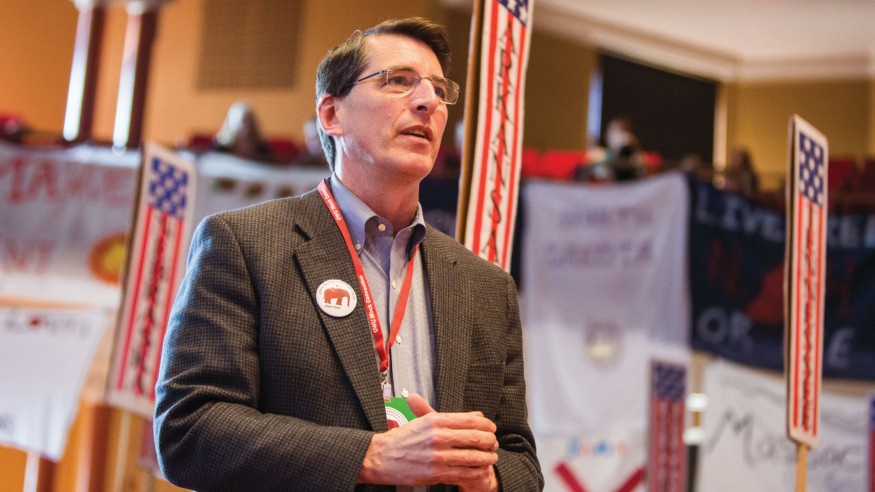
Civic – and Civil – Engagement
In February Ohio Wesleyan students, faculty, and staff gathered in Gray Chapel to continue a tradition that originated on this campus in 1884: Mock Convention. Consistent with past practice, Mock Convention replicates the national convention of the party not currently occupying the White House. This year’s convention was a gathering of the Republican Party. It was a showcase of the robust civic engagement that has long been treasured at Ohio Wesleyan—and a clear reminder of the desperate need in our society for deep but civil public debate and participation.
The delegates to Mock Convention engaged in spirited debate about the rules that would govern their work, the policies that would drive their campaign, and the candidates who would represent the Grand Old Party in the fall of 2016. They worked late into the night, and they were back early Saturday morning to complete their task. I had the pleasure of chairing the delegation from my home state of Arkansas, where Melissa and I were joined by OWU Trustee and Delaware County Commissioner Jeff Benton and a group of students.
Delegates heard from Congressman Pat Tiberi, who encouraged them to engage with issues of interest and to probe deeply to ensure that they are not misled by loud voices that too often are misinformed and/or simply unwilling to speak truthfully. Former Ohio Speaker Jo Ann Davidson, who will serve as cochair of the Republican Party Convention in Cleveland this summer, spoke to the delegates about the many issues that surround preparation for a national party convention. Commissioner Benton gave a primer on the importance of local government in the lives of every citizen.
Notably absent from the proceedings were angry tirades, blistering personal attacks, stinging insults and polemics irrelevant to the purpose of the gathering. The convention turned loud at times, but all in the spirit of informed debate and reasoned reflection. Students and faculty deliberated with one another and shared the convention floor as equals.

Ohio Wesleyan has a long history of educating citizens who are prepared to engage our civil society and advance the interests of our democracy. While Mock Convention dates from 1884, the commitment to preparation for public service often is associated most clearly with Ben Arneson, who served on the Ohio Wesleyan faculty for 36 years and in 1947 founded the Institute for Practical Politics and Public Affairs, which now bears his name. Arneson was fond of quoting Thomas Jefferson, who called on “better minds for better politics.”
Ben challenged his students to prepare for lives of public service by asking them to sign cards that became known as the Arneson Pledge. On the cards were written these words: “With a view to serving the public interest and regardless of the nature of my future vocation I pledge that, upon leaving college, I will devote a portion of my time to active and definite participation in public affairs.”
Among the many students of Ben Arneson who made an impact on our larger world was Arthur Fleming. Arthur Fleming graduated from Ohio Wesleyan in 1927 and returned to his alma mater to serve as president before later presidencies at the University of Oregon and Macalester College. His work in academic life was complemented by a lifetime of public service. He served as secretary of health, education, and welfare in the Eisenhower administration and later as chairman of the Civil Rights Commission and chairman of the White House Conference on Aging. He was the second layman to be named president of the National Council of Churches. He received two Presidential Medals of Freedom. Arthur Fleming fulfilled the Arneson Pledge in extraordinary ways.
Now more than ever, our country hungers for individuals who are prepared to engage in a thoughtful and civil manner with the most pressing issues of our time. Now more than ever, our world needs leaders who have more interest in bridges of unity than walls of separation even as we confront the profound threats to liberty and human dignity that are so prominent.
President, Ohio Wesleyan University
As I sat in Mock Convention I could not help thinking about the values reflected in Arneson and Fleming and echoed again in Gray Chapel this winter and their contrast with the noise that characterizes the political process in our country today. Now more than ever, our country hungers for individuals who are prepared to engage in a thoughtful and civil manner with the most pressing issues of our time. Now more than ever, our world needs leaders who have more interest in bridges of unity than walls of separation even as we confront the profound threats to liberty and human dignity that are so prominent. Now more than ever, our society needs individuals whose values are shaped and whose intellects are honed by the successors of Ben Arneson who teach on campuses like Ohio Wesleyan.
This may be the most important contribution of liberal arts education as we move toward the middle of the 21st century in a world that is increasingly divided and plagued with violence. We need thoughtful leaders who are prepared to engage in a civil society and to make the world a better place and who are committed to “active and definite participation in public affairs.”
Those of us on campus today have the privilege of serving an institution with a heritage that is strong, a mission that is noble, and a future that is bright. That heritage is reflected in the likes of Ben Arneson and Arthur Fleming and is renewed among our faculty and students every day. As you read about Mock Convention and about other news from campus, I welcome your thoughts on our work together and on its impact on our larger society.
![]()
Rock Jones
President, Ohio Wesleyan University
